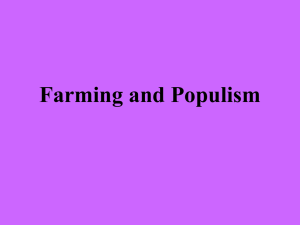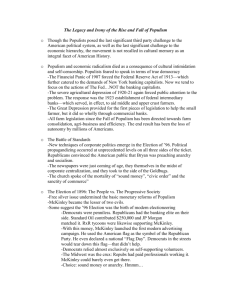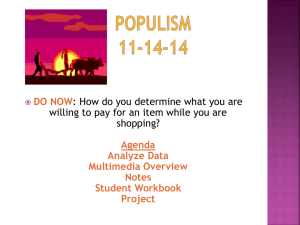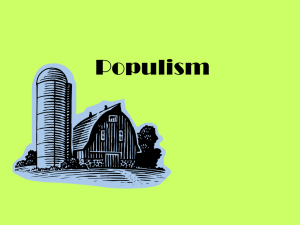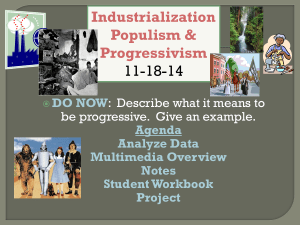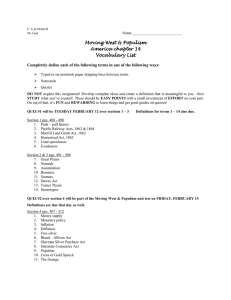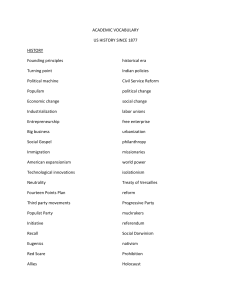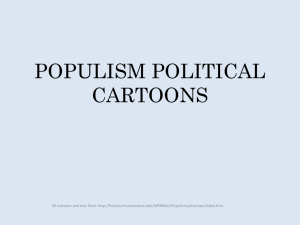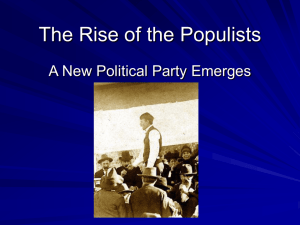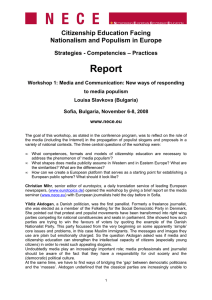Input Radicalism in politics and society: Reasons and prevention strategies
advertisement
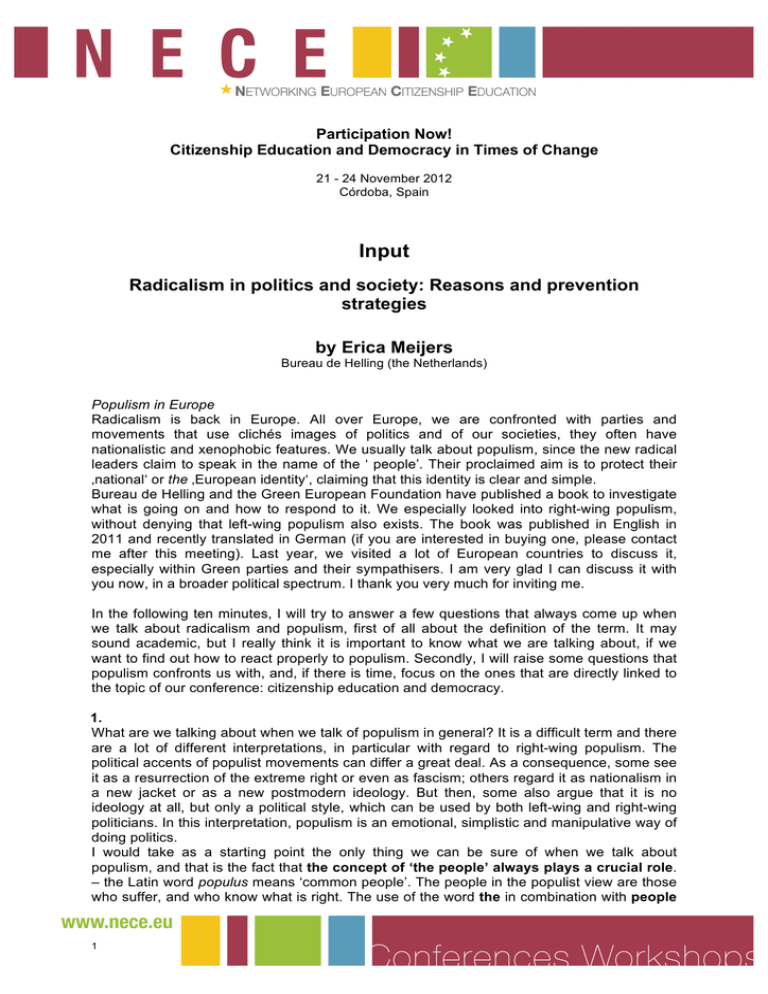
Participation Now! Citizenship Education and Democracy in Times of Change 21 - 24 November 2012 Córdoba, Spain Input Radicalism in politics and society: Reasons and prevention strategies by Erica Meijers Bureau de Helling (the Netherlands) Populism in Europe Radicalism is back in Europe. All over Europe, we are confronted with parties and movements that use clichés images of politics and of our societies, they often have nationalistic and xenophobic features. We usually talk about populism, since the new radical leaders claim to speak in the name of the ‘ people’. Their proclaimed aim is to protect their ‚national‘ or the ‚European identity‘, claiming that this identity is clear and simple. Bureau de Helling and the Green European Foundation have published a book to investigate what is going on and how to respond to it. We especially looked into right-wing populism, without denying that left-wing populism also exists. The book was published in English in 2011 and recently translated in German (if you are interested in buying one, please contact me after this meeting). Last year, we visited a lot of European countries to discuss it, especially within Green parties and their sympathisers. I am very glad I can discuss it with you now, in a broader political spectrum. I thank you very much for inviting me. In the following ten minutes, I will try to answer a few questions that always come up when we talk about radicalism and populism, first of all about the definition of the term. It may sound academic, but I really think it is important to know what we are talking about, if we want to find out how to react properly to populism. Secondly, I will raise some questions that populism confronts us with, and, if there is time, focus on the ones that are directly linked to the topic of our conference: citizenship education and democracy. 1. What are we talking about when we talk of populism in general? It is a difficult term and there are a lot of different interpretations, in particular with regard to right-wing populism. The political accents of populist movements can differ a great deal. As a consequence, some see it as a resurrection of the extreme right or even as fascism; others regard it as nationalism in a new jacket or as a new postmodern ideology. But then, some also argue that it is no ideology at all, but only a political style, which can be used by both left-wing and right-wing politicians. In this interpretation, populism is an emotional, simplistic and manipulative way of doing politics. I would take as a starting point the only thing we can be sure of when we talk about populism, and that is the fact that the concept of ‘the people’ always plays a crucial role. – the Latin word populus means ‘common people’. The people in the populist view are those who suffer, and who know what is right. The use of the word the in combination with people 1 is essential to populists. So the people are always opposed to the others. Populists create an unbridgeable gap between the ‘bad’ elite, the ‘good’ people and often a third group, the ‘other’. Populism has undergone different transformations since it first appeared at the end of the nineteenth century. On the one side the term populism goes back to the American farmers' protest movement; on the other, to the Russian narodniki in the same period. Both were agrarian movements fighting for the improvement of the hard life of farmers. Later on, in the twentieth century, in quite another context, the concept was used to describe political regimes in the Third World countries governed by charismatic leaders, and applied above all to Latin American politics in the 1960s and 1970s. (El pueblo unido jamas sera vincido). Today, the concept is once again undergoing transformation. After the research we did for our book and the debates we had throughout Europe, I came to the conclusion that one has to discern between on the one hand old-fashioned neo-nazi and fascist parties, like we see in Greece now (Golden dawn) and in Hungary (Jobbik). Those parties are populist as well, but they also are violent and authoritarian, which is not necessarily the case with all populist parties. On the other hand, we see a new type of right-wing populism. Let me just shortly mention its main characteristics. If you like, we can discuss it more deeply later on. 1. It wants to be democratic and even promote direct democracy. 2. It claims to defend the modern Europe with its individual human rights against newcomers from more traditional and collective cultures. 3. It rejects violence, racism and anti-semitism. We see a shift from racial arguments to cultural elements and to religion. There are two other features of populism, without which one cannot really understand the three mentioned above. These two constitute the factor of continuity with the extreme right of the past. But they are presented under the new forms I just mentioned. 1. ‘Exclusion and xenophobic nationalism’ is at the heart of modern right-wing populism today. It presents itself as democratic, but it wants to nationalize democracy, and exclude those who do not belong to the nation as they define it. Democracy is simply defined as: the majority rules. 2. Use of media and emotional politics. Populists are very strong in framing the political debate as they want to and therefore have a strong influence on other parties. They play the so important media-game very well, where the rational and analytical collection of news is more and more being replaced by a mixture of amusement and news. The populist emotional and provocative style goes very well with this development. Populists use simplified and fixed images, and by doing so succeed in framing political debates along their political views. 2. Now, let’s go back to the basic meaning of populism, which is present in all those movements, from the extreme right to the light versions, as well as in the left-wing variants. Populists claim to speak in the name of the people, pointing to the elite as the group who betrays the hardworking people. And then there is ‘the other’, those who have caused the bad situation we are in now (like the bankers in the left-wing variant), or those who distort the image of a pure society with a clear identity (like immigrants in the right-wing version). Populism, defined like this, immediately leads to questions on all three elements: 1. Who are the people? What is meant by this expression today, in the different contexts it is used in? 2. Does this gap between elite and people really exist? 2 3. How do populist define ‘the other’, in terms of race, religion, cultural etc. And what does this mean for their political views? (Majority rules, or a democracy that respects minority, like a consensus democracy…) Ad 1. What does the use of the term people means to the functioning of democracy? Do the people really exist, or are people moulded into a concept, made up by the populist leaders? In other words: is populism not intrinsic to democracy, reminding is of the radical roots of democracy? Does the slogan ‘power to the people’ today only have a virtual meaning, or can it still function in its direct and absolute form? I think this question is very relevant, if we want to learn from the Arabic Spring in relation to the European crisis. It leads us to the basic question of on what base are we taking decisions in a democratic society? The sovereignty of the people defines what democracy is all about. It is the justification, the founding ground of democracy. When democracy was first promoted in the 18th century, the aristocrats were against it, by using the exact same arguments that are used now against populism or direct democracy: everything is simplified, and: people who do not understand complex issues want to decide. Maybe we should accept that this is a reality of democracy we have to deal with. There is real dilemma here: if there is no representation of common people in the government, society easily becomes unjust, only defending the interests of the wealthy and highly educated. But if complex issues are simplified too much and the interests of the majority rules, the same risk exists, because complex issues are not being solved and minorities are being neglected and treated unjust. Populism is a risk of democracy, but it is intrinsic to it and in this respect can play a useful role by reminding the elites of a very essential question: are they really representing the majority of the population? Can elements of direct democracy prevent a society from losing its balance? (Swiss lessons: direct democracy only functions well together with a very well developed public debate, and an excellent education system.) Ad 2. This leads us to the second element of populism, the gap between ‘the people’ and the elite. Does it exist? Is it a bad thing or could it be useful that this gap exists? I will not go deeply into this question now, because it varies in the different contexts we are coming from. Just one remark that explains the shape of the actual gap. In Europe we have lived in a de-politized society (in Eastern Europe this presents itself very differently) since the Fall of the Berlin Wall. (Chantal Mouffe and Ernest Laclau talk about a post-political society): political issues were no longer defined by socio-economic divisions between left and right, but marked by a cultural opposition between the cosmopolitan multicultural ‘elite’ and the more conservative, nationalist ‘people’. Along with this new cultural opposition, a new political dividing line has developed between libertarian and authoritarian voters. The libertarian ruled, since in Western Europe most political representatives are highly educated. They represent the wealthy middle class that profits from the European Union. In combination with the financial and economic crisis, this leads to a ‘resurrection’ of the masses…’ Ad 3. How do populist define ‘the other’? Usually in terms of race, religion, culture etc. This question deserves a whole lecture in itself, because it concerns the way we construct our identities. I just want to say that we often define ourselves by what we are not, by creating a contrast between ‘us’ and an ‘other’. The meaning of the creation of fixed images, stereotypes for our identity, is strikingly articulated by the Greek poet Kavafis in his poem ‘Waiting for the barbarians’. All day long, the people on the market square are waiting for the barbarians. Everything they do and decide, is related to these terrible barbarians, who will take over their civilisation. But after a long day of waiting, the barbarians have not come – in that moment somebody announces that the barbarians did not come, because there are no 3 barbarians anymore. This causes a huge consternation on the market square. ‘And what should we do now, without barbarians?’ ask the people in the poem, ‘At least those people offered a way out…’ “Barbarians” still provide us with a way out of our own frustrations, identity-conflicts and forbidden feelings. That is the case with populists, but not only with them. We are all susceptible to this mechanism of projecting our own problems and dark sides onto others. That’s also the reason why there is no easy answer to populism. This answer is about having the courage to look at our own demons straight in the eye. It is about acknowledging our own fears and accept that the other will always remain the other, an enigma we will never fully understand. The biblical prohibition of making an image of God, which we also find in Islam, offers us an interesting way of dealing with the mystery of every human being. Populism deals with this mystery by eliminating it and replacing it by fixed images of others, and in the end, also of ourselves. It thus magnify in a political dangerous way a tendency we are all subject to. Therefore it is too easy to just reject populism as the enemy. By neglecting the democratic development of our societies, the political elites carry responsibility for the creation of populism. If they want to be part of the solution, they first have to accept that they are also part of the problem. Thank you. More on the new, modern face of populism 1. Populism today sees and presents itself as democratic: the new populists do not want to abolish democracy and function in a democratic environment: they form parties that can be voted for and are present in parliament. Of cause there are questions on the way they function: the PVV in the Netherlands for instance, is not democratic. There are no members, there is no congress or any other way voters can influence the politics and ideology of the party. Wilders is the only member of his party. But he claims to be a super democrat, since he claims to speak on behalf of ‘the people’, the hard working man in the street. He also calls for more instruments of direct democracy in our political constellation, like the left-wing parties did before. They are getting cold feet now. Wilders presents himself as the champion of democracy, since he claims to defend individual rights like the rights of women and homosexuals and the freedom of speech. He clearly condemns violence. He was brought to justice, but was never condemned, although this could also be seen as a change of atmosphere in society. 2. Populists seldom use racial arguments these days. There is a shift from racial arguments to cultural elements and to religion. Populists often condemn racism and anti-Semitism. (By the way, the defenders of apartheid did the same; they argued that what they called ‘racial separation’ was by no means unjust or discriminatory.) This is not the case everywhere of cause. But ‘our’ Geert Wilders presents himself as the biggest friend of Israel and the Jews. Sometimes he gets himself into trouble, like when he applauded the proposal of the Animal Party to prohibit the ritual slaughtering of animals, without anaesthesia. It was meant of cause to affect the Muslims, but the Jewish lobby turned out to be a lot more effective and strong. The argument was that animal rights are more important than religious rights. 3. Thirdly, we can notice a shift from collectivism to individualism. Although the term ‘the people’, is a collective concept of cause, populists in their presentation especially defend individual rights, for instance of Muslim-women against the Muslim community as a whole. Individualistic values, coined in the sixties, are defended against the supposedly ‘backward’ collectivist traditions within migrant and Islamic communities. Populism flourishes within a culture of the ego: my wish should be fulfilled right now. 4 Today it defends maybe not the slogan ‘My people first’, but simply ‘me first’. But it is an individualism that goes hand in hand with authoritarian politics. If right-wing populism dwells on the difference between us and the “other” – has Europe become the new “other”. Jobbik burning European flags in Hungary, FPÖ wanting to go back to the Schilling, Wilders wanting to leave the EU. Yes, in the media presentation, but no, in the political strategy. The others are still those who threaten our supposed national identity: the Muslims especially, but in a way all immigrants. If the EU doesn’t exist anymore in its actual form, there will be no immigrations laws anymore, Holland can decide on its own borders and immigration politics. There would be no international treaties bothering anymore. And of cause: a nationalist will always be opposed to internationalism that goes further than just cooperation to promote the national interests. If Netherlands has been a forerunner in the populism debate and hence also an initiator of this book publication, can we draw conclusions from the recent election results in the Netherlands or is it a temporary halt? The leader of the greens, Jolande Sap, although the party lost a lot (from 10 to 4 seats, from about 6,8 to 2,3 percent) PVV 15 seats, 10 % (was 24 seats (15,5 %) VVD 26,6 %, 41 seats (was 31, 20,4 %) PvdA 24,8 %, 38 seats (was 30, 19,6 %) SP 9,7 %, 15 seats (about the same) CDA 8,5 %, 13 seats (was 21, 13,7 %) The political centre is back. I don’t believe that: the centre has gone to the sides: PvdA to the left, VVD to the right. CDA, the real centre, lost. PVV can easily come back. People can be disappointed because it caused the breaking down of the government. He cannot cooperate. And there were some affairs within the party. But populism stays. When VVD and PvdA play the left and right card again, they can keep polism away, but now they are in this together, so they probably will not be able to do so. Than there is a new chance for Wilders. 5
